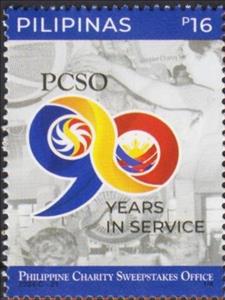Stamp: PCSO 90 Years in Service (Philippines 2024)
PCSO 90 Years in Service (Philippines 2024)
30 October (Philippines ) within release Philippine Charity Sweepstakes Office (PSCO) 90 Years (2024) goes into circulation Stamp PCSO 90 Years in Service face value 16 Philippine piso
| Stamp PCSO 90 Years in Service in catalogues | |
|---|---|
| Colnect codes: | Col: PH 2024.10.30-01a |
Stamp is square format.
stamp from se-tenant block of fourAlso in the issue Philippine Charity Sweepstakes Office (PSCO) 90 Years (2024):
- Stamp - National Day of Charity face value 16;
- Stamp - National Day of Charity face value 16;
- Stamp - PCSO 90 Years in Service face value 16;
- Stamp - PCSO 90 Years in Service face value 16;
- Se-tenant - Philippine Charity Sweepstakes Office (PSCO) 90th Anniv. face value 4*16;
|
Data entry completed
53%
|
|
|---|---|
| Stamp PCSO 90 Years in Service in digits | |
| Country: | Philippines |
| Date: | 2024-10-30 |
| Print: | Offset lithography |
| Emission: | Commemorative |
| Format: | Stamp |
| Face Value: | 16 Philippine piso |
Stamp PCSO 90 Years in Service it reflects the thematic directions:
An anniversary is the date on which an event took place or an institution was founded in a previous year, and may also refer to the commemoration or celebration of that event. For example, the first event is the initial occurrence or, if planned, the inaugural of the event. One year later would be the first anniversary of that event. The word was first used for Catholic feasts to commemorate saints. Most countries celebrate national anniversaries, typically called national days. These could be the date of independence of the nation or the adoption of a new constitution or form of government. The important dates in a sitting monarch's reign may also be commemorated, an event often referred to as a "Jubilee".
help, especially in the form of money, given freely to people who are in need, for example because they are ill, poor, or have no home, and organizations that provide this help: She does a lot of work for charity.
Logos is a term used in Western philosophy, psychology and rhetoric, as well as religion (notably Christianity); among its connotations is that of a rational form of discourse that relies on inductive and deductive reasoning.
A lottery (or lotto) is a form of gambling that involves the drawing of numbers at random for a prize. Some governments outlaw lotteries, while others endorse it to the extent of organizing a national or state lottery. It is common to find some degree of regulation of lottery by governments. The most common regulations are prohibition of sale to minors and licensing of ticket vendors. Although lotteries were common in the United States and some other countries during the 19th century, by the beginning of the 20th century, most forms of gambling, including lotteries and sweepstakes, were illegal in the U.S. and most of Europe as well as many other countries. This remained so until well after World War II. In the 1960s, casinos and lotteries began to re-appear throughout the world as a means for governments to raise revenue without raising taxes.
A number is a mathematical object used to count, measure, and label. The most basic examples are the natural numbers 1, 2, 3, 4, and so forth. Numbers can be represented in language with number words. More universally, individual numbers can be represented by symbols, called numerals; for example, "5" is a numeral that represents the number five. As only a relatively small number of symbols can be memorized, basic numerals are commonly organized in a numeral system, which is an organized way to represent any number. The most common numeral system is the Hindu–Arabic numeral system, which allows for the representation of any non-negative integer using a combination of ten fundamental numeric symbols, called digits. In addition to their use in counting and measuring, numerals are often used for labels (as with telephone numbers), for ordering (as with serial numbers), and for codes (as with ISBNs). In common usage, a numeral is not clearly distinguished from the number that it represents.





